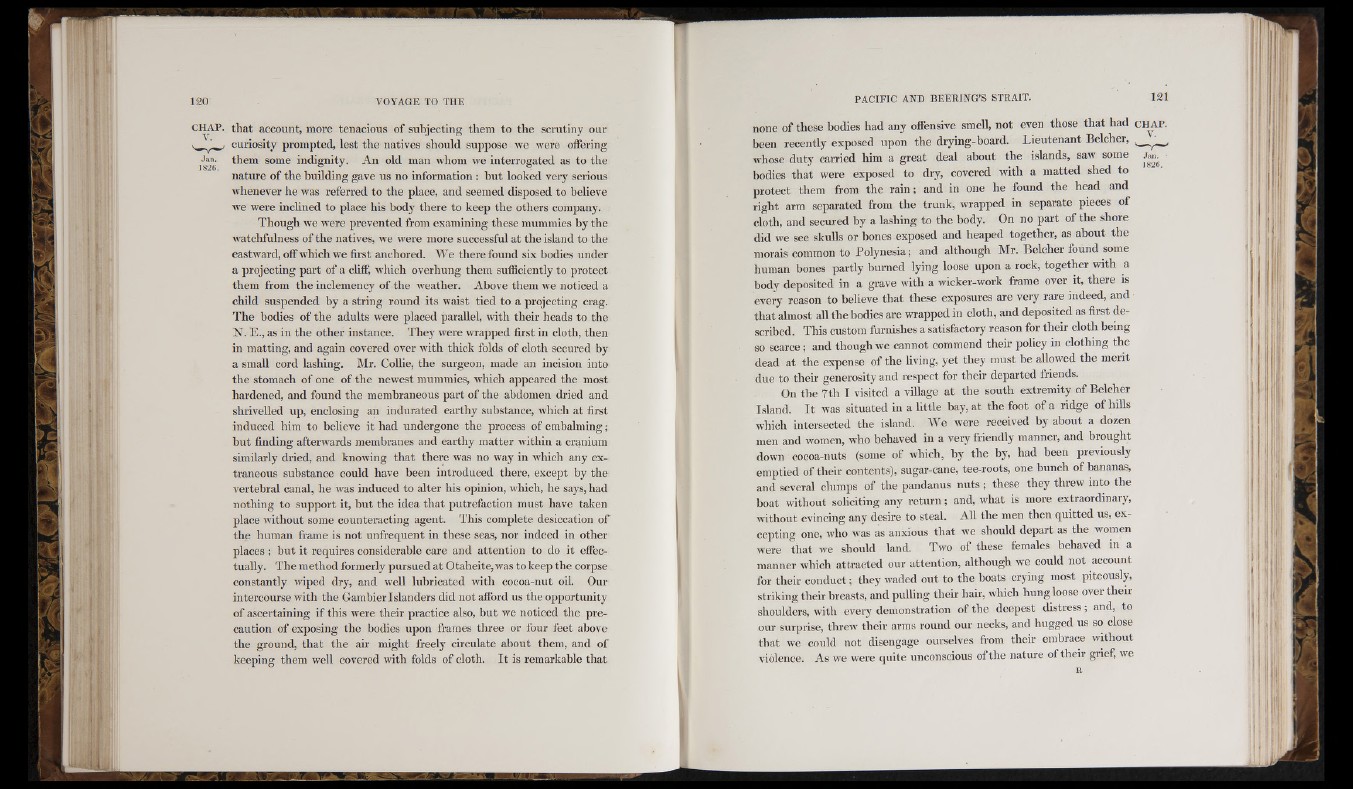
that account, more tenacious of subjecting them to the scrutiny our
curiosity prompted, lest the natives should suppose we were offering
them some indignity. An old man whom we interrogated as to the
nature of the building gave us uo information : but looked very serious
whenever he was referred to the place, and seemed disposed to believe
we were inclined to place his body there to keep the others company.
Though we were prevented from examining these mummies by the
watchfulness of the natives, we were more successful at the island to the
eastward, off which w'c first anchored. We there found six bodies under
a projecting part of a cliff, which overhung them sufficiently to protect
them from the inclemency of the weather. Above them we noticed a
child suspended by a string round its waist tied to a projecting crag.
The bodies of the adults were placed parallel, with their heads to the
N. E., as in the other instance. They were wrapped first in cloth, then
in matting, and again covered over with thick folds of cloth secured by
a small cord lashing. Mr. CoUie, the surgeon, made an incision into
the stomach of one of the newest mummies, which appeared the most
hardened, and found the membraneous part of the abdomen dried and
shrivelled up, enclosing an indurated earthy substance, which at first
induced him to believe it had undergone the process of embalming;
but finding afterwards membranes and earthy matter within a cranium
similarly dried, and knowing that there was no way in which any extraneous
substance could have been introduced there, except by the
vertebral canal, he was induced to alter his opinion, which, he says, had
nothing to support it, but the idea that putrefaction must have taken
place without some counteracting agent. This complete desiccation o f
the human frame is not unfrequent in these seas, nor indeed in other
places ; but it requires considerable care and attention to do it effectually.
'I’he method formerly pursued at Otaheite, was to keep the corpse
constantly wiped dry, and well lubricated with cocoa-nut oil. Our
intercourse with the Gambierlslanders did not afford us the opportunity
of ascertaining if this were their practice also, but we noticed the precaution
of exposing the bodies upon frames three or four feet above
the ground, that the air might freely circulate about them, and of
keeping them well covered with folds of cloth. It is remarkable that
none of these bodies had any offensive smell, not even those that had cFWP.
been recently exposed upon the drying-board. Lieutenant Belcher,
whose duty carried him a great deal about the islands, saw some
bodies that were exposed to dry, covered with a matted shed to
protect them from the rain; and in one he found the head and
right arm separated from the trunk, wrapped in separate pieces of
cloth, and secured by a lashing to the body. On no part of the shore
did we see skulls or bones exposed and heaped together, as about the
morals common to Polynesia; and although Mr. Belcher found some
human bones partly burned lying loose upon a rock, together with a
body deposited in a grave with a wicker-work frame over it, there is
every reason to believe that these exposures are very rare indeed, and
that almost all the bodies are wrapped in cloth, and deposited as first described.
This custom furnishes a satisfactory reason for their cloth being
so scarce; and though we cannot commend their policy in clothing the
dead at the expense of the living, yet they must be allowed the merit
due to their generosity and respect for their departed friends.
On the 7th I visited a village at the south extremity of Belcher
Island. It was situated in a little bay, at the foot of a ridge of hills
which intersected the island. We were received by about a dozen
men and women, who behaved in a very friendly manner, and brought
down cocoa-nuts (some of which, by the by, had been previously
emptied of their contents), sugar-cane, tee-roots, one bunch of bananas,
and several clumps of the pandanus nuts ; these they threw into the
boat without soliciting any return ; and, what is more extraordinary,
without evincing any desire to steal. All the men then quitted us, excepting
one, who was as anxious that we should depart as the women
were that we should land. Two of these females behaved in a
manner which attracted our attention, although we could not account
for their conduct; they waded out to the boats crying most piteously,
striking their breasts, and pulling their hair, which hung loose over their
shoulders, with every demonstration of the deepest distress ; and, to
our surprise, threw their arms round our necks, and hugged us so close
that we could not disengage ourselves from their embrace without
violence. As we were quite unconscious of the nature of their grief, we
Jan.
1826.
-